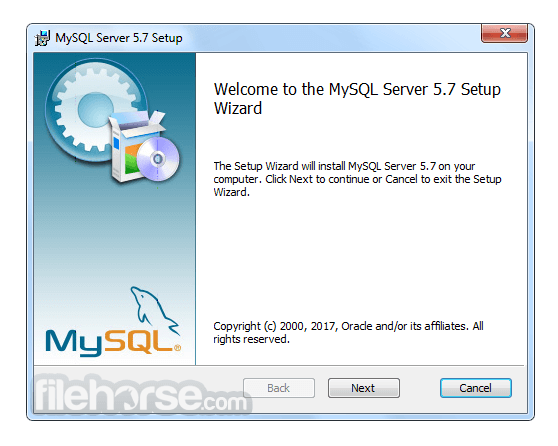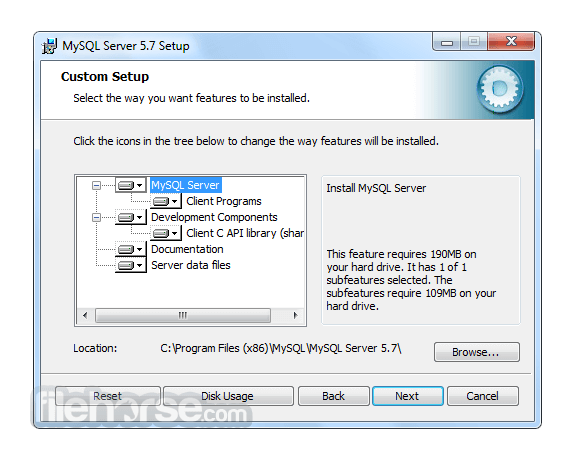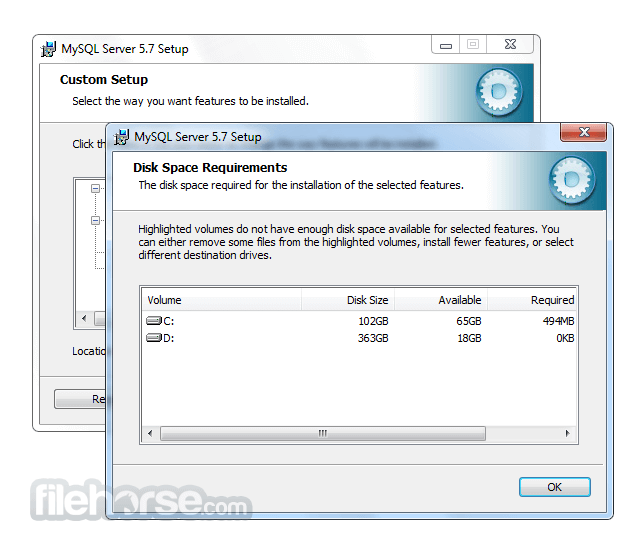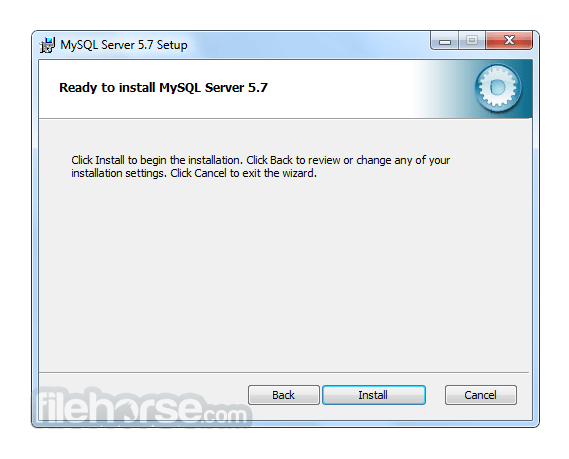-
Latest Version
-
Operating System
Windows XP64 / Vista64 / Windows 7 64 / Windows 8 64
-
User Rating
Click to vote -
Author / Product
-
Filename
mysql-5.5.37-winx64.msi
-
MD5 Checksum
9dada8a0d19b86dcd893a46c00fad657
Sometimes latest versions of the software can cause issues when installed on older devices or devices running an older version of the operating system.
Software makers usually fix these issues but it can take them some time. What you can do in the meantime is to download and install an older version of MySQL 5.5.37 (64-bit).
For those interested in downloading the most recent release of MySQL or reading our review, simply click here.
All old versions distributed on our website are completely virus-free and available for download at no cost.
We would love to hear from you
If you have any questions or ideas that you want to share with us - head over to our Contact page and let us know. We value your feedback!
What's new in this version:
Functionality Added or Changed:
- On Solaris, mysql_config --libs now includes -R/path/to/library so that libraries can be found at runtime. Bugs Fixed:
- InnoDB: A regression introduced by Bug #14329288 would result in a performance degradation when a compressed table does not fit into memory.
- InnoDB: The maximum value for innodb_thread_sleep_delay is now 1000000 microseconds. The previous maximum value (4294967295 microseconds on 32-bit and 18446744073709551615 microseconds on 64-bit) was unnecessarily large. Because the maximum value of innodb_thread_sleep_delay is limited by the value set for innodb_adaptive_max_sleep_delay (when set to a non-zero value), the maximum value for innodb_thread_sleep_delay is now the same as the maximum value for innodb_adaptive_max_sleep_delay.
- InnoDB: In debug builds, creating a unique index on a binary column, with input data containing duplicate keys, would cause an assertion.
- InnoDB: InnoDB would fail to start when innodb_data_file_path specified the data file size in kilobytes by appending K to the size value.
- InnoDB: An insert buffer merge would cause an assertion error due to incorrectly handled ownership information for externally stored BLOBs.
- InnoDB: Assertion failure in thread thread_num in file ibuf0ibuf.cc line 4080
- InnoDB: Failing assertion: rec_get_deleted_flag(rec, page_is_comp(page))
- InnoDB: Decreasing the auto_increment_increment value would have no affect on the next auto-increment value.
- Replication: The server did not handle correctly the insertion of a row larger than 4 GB when using row-based replication.
- Replication: When using row-based replication, an additional auto-increment column on the slave version of a table was not updated correctly; a zero was inserted instead.
- Replication: Statements involving the Performance Schema tables should not be written to the binary log, because the content of these tables is applicable only to a given MySQL Server instance, and may differ greatly between different servers in a replication topology. The database administrator should be able to configure (INSERT, UPDATE, or DELETE) or flush (TRUNCATE TABLE) performance schema tables on a single server without affecting others. However, when replicating from a MySQL 5.5 master to a MySQL 5.5 or later slave, warnings about unsafe statements updating Performance Schema tables were elevated to errors. For MySQL 5.6 and later slaves, this prevented the simultaneous use of performance_schema and GTIDs (see Replication with Global Transaction Identifiers, in the MySQL 5.6 Manual).
- Compilation failed if MySQL was configured with CFLAGS set to include a -Werror option with an argument.
- A shared libmysqld embedded server library was not built on Linux.
- While printing the server version, the mysql client did not check for buffer overflow in a string variable.
- Contraction information in a collation could be mishandled, resulting in incorrect decisions about whether a character is part of a contraction, and miscalculation of contraction weights.
- DROP TRIGGER succeeded even with the read_only system variable enabled.
- Updating the Performance Schema setup_instruments table on a replication master caused a slave to exit.
- Due to a race condition, it was possible for two threads to end up with the same query ID for different queries.
- When run by root, mysqld --help --verbose exited with a nonzero error code after displaying the help message.
- MySQL client programs from a Community Edition distribution could not connect using SSL to a MySQL server from an Enterprise Edition. This was due to a difference in certificate handling by yaSSL and OpenSSL (used for Community and Enterprise, respectively). OpenSSL expected a blank certificate to be sent when not all of the --ssl-ca, --ssl-cert, and --ssl-key options were specified, and yaSSL did not do so. To resolve this, yaSSL has been modified to send a blank certificate when an option is missing.
- A deadlock error occurring during subquery execution could cause an assertion to be raised.
- The Performance Schema stage/sql/Waiting to get readlock instrument is no longer used and has been removed.
- For system variables that take a string value, SET statements permitted an unquoted value, but values that contained dots were parsed incorrectly and only part of the value was assigned. For example, SET GLOBAL slow_query_log_file = my_slow.log assigned the value my_slow. Now such values must be quoted or an error occurs.
 OperaOpera 125.0 Build 5729.49 (64-bit)
OperaOpera 125.0 Build 5729.49 (64-bit) MalwarebytesMalwarebytes Premium 5.4.5
MalwarebytesMalwarebytes Premium 5.4.5 PhotoshopAdobe Photoshop CC 2026 27.2 (64-bit)
PhotoshopAdobe Photoshop CC 2026 27.2 (64-bit) BlueStacksBlueStacks 10.42.153.1003
BlueStacksBlueStacks 10.42.153.1003 OKXOKX - Buy Bitcoin or Ethereum
OKXOKX - Buy Bitcoin or Ethereum Premiere ProAdobe Premiere Pro CC 2025 25.6.3
Premiere ProAdobe Premiere Pro CC 2025 25.6.3 PC RepairPC Repair Tool 2025
PC RepairPC Repair Tool 2025 Hero WarsHero Wars - Online Action Game
Hero WarsHero Wars - Online Action Game TradingViewTradingView - Trusted by 60 Million Traders
TradingViewTradingView - Trusted by 60 Million Traders WPS OfficeWPS Office Free 12.2.0.23155
WPS OfficeWPS Office Free 12.2.0.23155










Comments and User Reviews